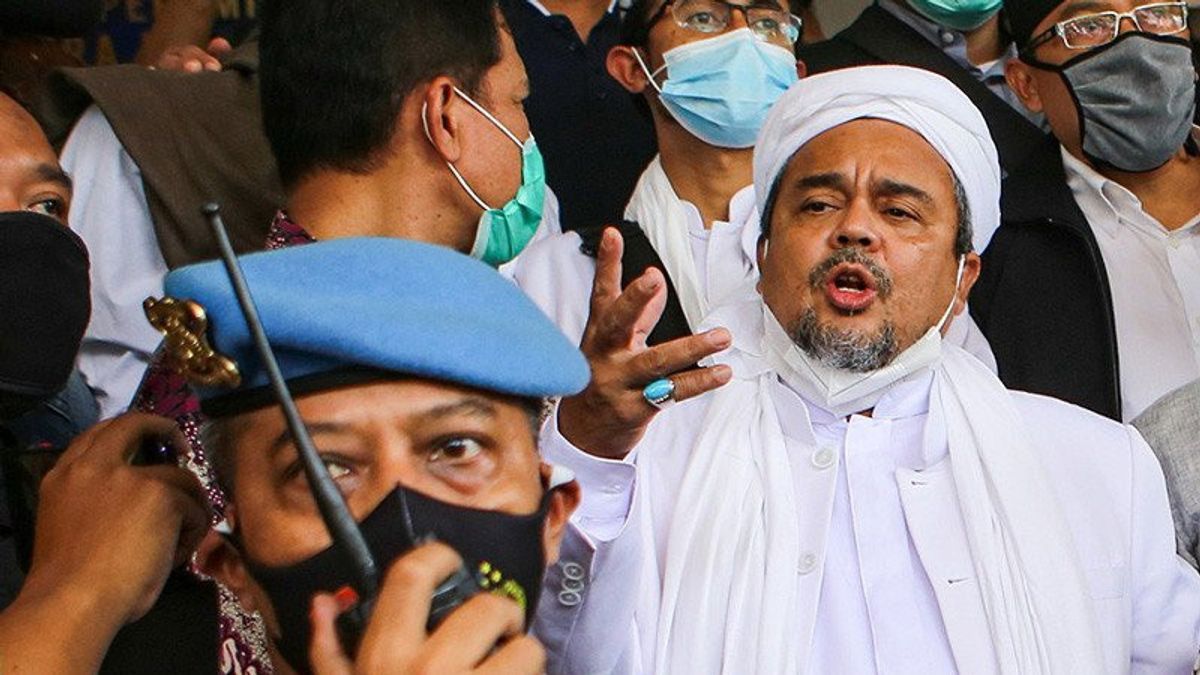JAKARTA - Habib Rizieq Shihab walked out of the East Jakarta District Court courtroom. There are several reasons that made Rizieq Shihab leave the trial agenda, one of which he questioned why the virtual trial and himself were prohibited from attending. The judge responded with disappointment to Rizieq Shihab's decision to walk out. Let's stand in the middle. In fact, how does the law view the virtual trial and walkout case of a defendant?
Rizieq Shihab's walkout was carried out when the UMMI Bogor Hospital swab test case was held. Rizieq Shihab's walkout began when a debate broke out between the panel of judges, Rizieq Shihab and his team of lawyers.
Rizieq Shihab wants to be presented directly at the trial. Not virtual. The judge refused. They had had deliberation before deciding that the trial remained virtual.
"So we have answered directly regarding the petition," said the presiding judge delivering the results of the deliberation at the East Jakarta District Court, Tuesday, March 16.
Rizieq Shihab immediately interrupted. He admitted that he had expressed his desire to be present at the hearing since a long time ago. And that letter, Rizieq Shihab believes it has been received by the East Jakarta District Court.
"So I have conveyed the letter directly to the panel of judges. And we have a receipt that has been sent to the MA and KY," said Rizieq.
"The panel of judges has not seen the file," the judge replied.
"Sorry, sorry, because I have been jailed for 3 months. I want this trial to be fair. I want to get my rights and my freedom to attend the trial," Rizieq Shihab replied.

In Rizieq Shihab's eyes, there was no reason for the judge to refuse to attend. After all, the prosecutor was present. Even with a number of people who were allowed to come to the East Jakarta District Court, Rizieq Shihab thought.
"If many prosecutors can attend, why can't I be alone," said Rizieq.
The panel of judges then explained that the basis for making virtual court decisions was not based on any technical problems. Only the results of deliberation, they said.
Hearing the answer, dozens of Rizieq Shihab's lawyers came out. "We will not take part in the online trial. I will walk out. The trial is with a wall," said lawyer Rizieq Shihab.
Rizieq Shihab responded to the situation by standing up and immediately leaving the 'trial screen'. "I will not attend this trial and will leave. I apologize. Moreover, my lawyer is a WO. Sorry. Thank you," said Rizieq, followed by the vote of takbir at the East Jakarta District Court.
Jerinx's walkout rejects virtual trials
Before Rizieq Shihab, I Gede Ari Astina alias Jerinx also walked out for refusing the virtual trial. The incident occurred at the inaugural trial of the case of the 'IDI lackeys WHO' hate speech that ensnared Jerinx.
"Once again I still reject the trial that was held online because I felt that my rights were not fully represented by this trial," Jerinx said in the trial which was broadcast live via the YouTube channel of the Denpasar District Court.
The virtual trial, in Jerinx's eyes, is ineffective and removes many of his interests. Jerinx felt the judge couldn't give a full assessment without seeing his gesture and body language firsthand.
"So it is possible that the decisions taken later may not be right. Thank you, Your Honor," said Jerinx.
In contrast to the panel of judges in the Rizieq trial. In the Jerinx case, the panel of judges finally allowed Jerinx to appear in person in the courtroom.
How does the law view trial walkouts?Even though he allowed the trial to be continued face-to-face, member of the panel of judges I Made Pasek said that Jerinx's walkout would be a reason for criminal charges. The action was deemed to have injured the judiciary (contempt of court).
"The defendant had left the courtroom as a protest against the trial which was carried out online, where the action was not supposed to be done because it injured the court's authority and the defendant's actions were carried out continuously," he said.
There are a number of common situations associated with trial walkouts. Usually the walkout is carried out by witnesses, attorneys, or even judges. Each action has consequences and a different legal perspective. In the case of Rizieq Shihab and Jerinx, the defendant carried out a walkout.
As the judge at the trial Jerinx said, there were consequences of the walkout by the defendant. In addition to increasing penalties, walkouts can cause legal harm. For example, lost opportunities to extract facts and truths from the trial. In fact, extracting the facts of the trial is very much needed to determine the defense strategy.
Regarding the weighting of the sentence due to the walkout, a criminal law expert from Trisakti University, Abdul Fickar Hadjar, confirmed that this perspective is the authority of the judge. However, he also emphasized that judges must be fully aware of the legal situation.
"That is a matter of the judge's authority. But the right to defend oneself with clear communication is the right to justice. So what is the difficulty in presenting it?" he said to VOI, Tuesday, March 16.
The law sees a virtual trialThere Abdul Fickar Hadjar emphasized that the judge should still see the interests of the defendant before deciding to burden the defendant with legal weight. The right to have clear direct communication, freedom of expression in response to witness statements, said Abdul Fickar, is far more essential. There are great losses experienced by the judiciary through virtual trials.
"The point is that a lot of momentum is lost because the trial is determined by whether Zoom's communication tool is good or not," Abdul Fickar.
"In principle, the court must be attended by the defendant. If the defendant does not attend, it is not legal. Only corruption and ML can be carried out inabsentia, on the grounds of saving state money. For other crimes, including crowds, the defendant must be present, otherwise the trial is invalid, "he added.
Moreover, beyond the judges' considerations, Abdul Fickar invites us to look at a more entrenched legal basis, the matter of holding virtual trials which are actually based on the Supreme Court Circular. Meanwhile, the basis for holding an open trial is an order from UU ic KUHAP.
"So, by strictly implementing the COVID-19 protocol, the trial must still be held directly and openly by presenting the defendant directly in accordance with the provisions of the procedural law ic KUHAP," Abdul Fickar.
* Read other information about RIZIEQ SHIHAB or read other interesting articles by Rizky Adytia Pramana and Yudhistira Mahabharata.
BERNAS OthersThe English, Chinese, Japanese, Arabic, and French versions are automatically generated by the AI. So there may still be inaccuracies in translating, please always see Indonesian as our main language. (system supported by DigitalSiber.id)








